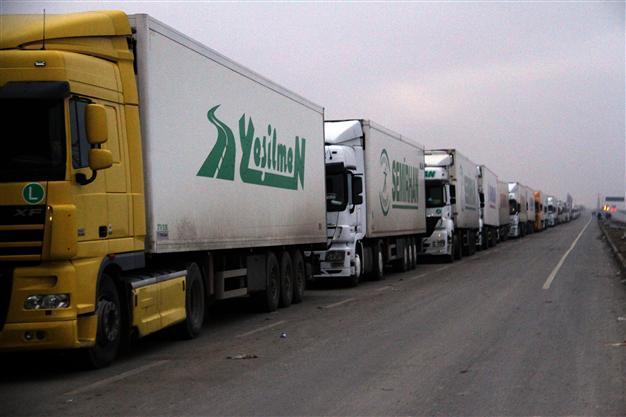Turkish trucks to pay less while crossing Iran border
ANKARA - Anadolu Agency

Truıcks queue near the Gürbulak border crossing. AA Photo
Turkish trucks will pay lower fuel surcharges while crossing the border into Iran, according to an agreement signed between the two countries Jan. 15.Due to fuel prices being cheaper in Iran, Turkish vehicles were ordered to pay a surcharge of 1.60 euros per liter to avoid the illegal transportation of fuel.
Turkish Development Minister Cevdet Yılmaz and Iranian Communications and Information Minister Mahmud Vaizi signed an agreement in Ankara to reduce the price to 0.30 euros per liter, starting today.
“We are very glad to settle the problem that was long discussed,” said Yılmaz. “We are determined to create a smoother environment through mutual work.”
According to the agreement, vehicles that will transit through Iran to a third country will not pay any surcharge starting Feb. 1.
Vaizi said political collaboration between the two countries had reached a level where any problem could easily be tackled.
He added that the two countries are working together to make customs more convenient as well as building a new customs station.
Following a meeting with Vaizi on Jan. 14 in Ankara, Yılmaz said the relationship between Iran and Turkey had deep roots.
“We are working on new cooperation in several areas to achieve a $30 billion trade target,” he added.
According to Yılmaz, bilateral trade stood at $11.3 billion in the first 10 months of last year and more than $1.3 billion was invested inside Iran by 174 Turkish companies.
According to Turkish officials, trade between Turkey and Iran stood at $22 billion in 2012 before dipping
to $14.5 billion in the following year due to economic sanctions imposed on Tehran.
Yılmaz said Turkey wanted a free-trade agreement with its neighbor following a preferential trade agreement, which was signed in 2014 and which came into force earlier this month.
















